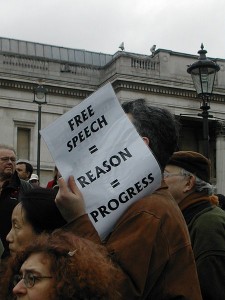fostering a culture of silence: australian public servants sanctioned for anti-government comments
According to recent comments made in Parliament by Attorney General, George Brandis, people have a right to be bigots. But code of conduct documents leaked from the Department of Prime Minister & Cabinet last week indicate that this doesn’t give you the right to say bigoted things about your boss if your boss also happens to be the Prime Minister of Australia.
The social media policy for employees of the Department of Prime Minister and Cabinet (PM&C), leaked to the media late last week, goes further than the standard public service code of conduct by encouraging public servants to ‘dob in’ their colleagues if they know they have made comments on social media which are critical of the government or of government policy. This extends to social media accounts held in their capacity as public officials, accounts for personal use and accounts held anonymously. As you’d expect, like the codes of conduct used by other departments, it prevents public servants from publishing comments or opinions based on information that is classified or not available to the public which they have learned through their employment. But significantly, this new code also extends to comments made about information that is publicly available.
So, in theory, if an employee of PM&C were to create an anonymous Twitter account and use it to criticise the Abbott Government’s stance on refugees, only using information gathered from the mainstream media, it could be considered a breach of the code of conduct and their employment could be terminated. Interestingly, Michaela Banerji, an employee of the Department of Immigration was sacked last year for doing just that – and this wasn’t even under the new code of conduct! She recently accepted an out of court settlement, after being advised that challenging her dismissal on the basis of the Constitution would be a lengthy and costly process. She has since published an open letter to Attorney General George Brandis stating that she believed her dismissal was unconstitutional, based on the fact that public servants (like anyone else) have an ‘implied’ right to freedom of political communication.
Unfortunately for Ms Banerji, recently appointed Commissioner for Human Rights, Tim Wilson, isn’t likely to speak up in her defence, despite being a vocal advocate for free speech. According to an opinion piece published by Fairfax Media, Wilson doesn’t think that codes of conduct come into the realm of ‘human rights’ because they are voluntarily entered into by employees. Putting aside the bargaining power held by the Australian government as one of the largest employers in the country, it’s not a little concerning when the nation’s law makers don’t consider the laws created for the rest of society are sufficient for their own codes of conduct. While Wilson acknowledges that the public service is a more complicated employer/employee relationship than most, he raises the bizarre example that it is perfectly acceptable for a public servant to be a member of a political party.
So if the problem here really is (as stated by Wilson) that criticising the government via social media is an indication that the employee in question won’t be able to do their job in an impartial or unbiased manner, why is it not considered partiality for public servants to be members of political parties? The visibility of new media seems partly to blame – in the past a person could attend the local branch meetings of their party of choice and fully subscribe to the ideals of that party even when they directly contravened the policies or practices of the government of the day in relative anonymity. Now anyone with a twitter account can have their opinions go viral overnight. And, of course, while public servants are still allowed to join any political party, they are only prohibited from publishing online their criticisms of the government – presumably no one is in danger of getting sacked for starting a ‘Sir Abbott for King of the World’ Facebook page.
At this point, any good politics student will be asking the question but what does this mean for the ‘frank and fearless’ advice the public service is supposed to provide to government? I’m glad you asked. It could be argued that the problem of disgruntled public servants venting on social media is a relatively small one. Given the vastness of the Australian public service, one might say, it’s hardly surprising that a few from within the ranks overstep the line. But the PM&C code as it now stands is in danger of fostering a culture of silence – if a person can be fired for posting something anonymously online, they’re likely to think twice before being critical of government policy in an official capacity, even if that criticism is well founded and reasonable. And that spells a real problem for governments’ ability to deliver good public policy.


